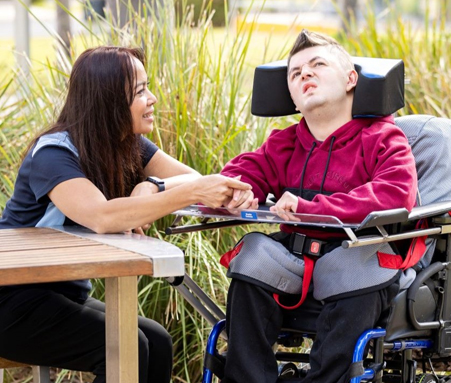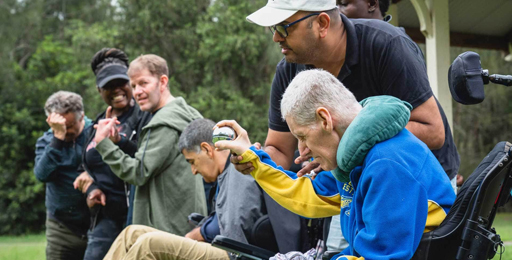NDIS Support for Down Syndrome Comprehensive Assistance for a Better Life

Down Syndrome, a genetic condition caused by the presence of an extra chromosome 21,
affects approximately one in 700 births worldwide. While individuals with Down Syndrome
face unique challenges, they also bring remarkable capabilities and potential to thrive
when given the proper support. In Australia, the National Disability Insurance Scheme
(NDIS) plays a crucial role in empowering individuals with Down Syndrome and their
families by providing tailored support and resources to improve their quality of life.
This article delves into the various aspects of NDIS support for Down Syndrome,
highlighting the significance, available services, and impact on participants and their
caregivers.
The NDIS is a government-funded program designed to provide individuals with disabilities access to essential services and supports. The scheme focuses on promoting independence, inclusion, and participation in everyday life, ensuring that people with disabilities can lead fulfilling lives.
For individuals with Down Syndrome, the NDIS offers a structured framework to identify needs, set goals, and receive funding for specific supports. These supports encompass a wide range of services, including healthcare, education, therapy, and community engagement, all of which contribute to holistic development.

The NDIS aims to enable individuals with Down Syndrome to perform daily activities independently by providing tools, training, and resources.

Speech and language therapy funded by the NDIS helps participants develop effective communication skills, improving social interactions and self-expression.

Through community-based programs and activities, the NDIS encourages inclusion, allowing individuals to build meaningful relationships and engage with society.

Families and caregivers of individuals with Down Syndrome receive guidance, respite care, and training to ensure they can provide optimal support while maintaining their well-being.

Eligibility for NDIS support is determined based on several factors, including age, residency, and the impact of a disability on daily life. Individuals with Down Syndrome typically qualify due to the significant and lifelong nature of the condition.
Age: The participant must be under 65 years of age when accessing the scheme.
Residency: Applicants must be Australian citizens, permanent residents, or holders of a Protected Special Category Visa.
Disability Impact: The condition must result in substantial functional impairment, affecting the ability to perform daily tasks independently.
Families can apply for NDIS support through a straightforward process involving submission of required documentation, an initial planning meeting, and the creation of a personalized NDIS plan.
The NDIS provides funding across various categories tailored to the specific needs of participants
with
Down Syndrome. These supports include:
Assistance with Daily Living: Funding for personal care activities, such as dressing, grooming, and meal preparation.
Consumables: Access to necessary items like continence aids and mobility equipment.
Transportation: Support for travel needs, enabling participation in community activities, work, or education.
Therapies: Speech therapy, occupational therapy, and physiotherapy to enhance communication, motor skills, and physical health.
Life Skills Development: Programs to teach essential skills, such as budgeting, cooking, and social interactions.
Education Support: Assistance with transitioning into schools or educational institutions and receiving tailored learning accommodations.
Assistive Technology: Funding for devices like hearing aids, specialized communication tools, or mobility aids.
Home Modifications: Customizations to living spaces, such as installing ramps or grab bars, to ensure safety and accessibility.
Participation in group activities, recreational programs, and community events to foster social inclusion.
An NDIS plan is a personalized roadmap outlining the participant’s goals, needs, and allocated
supports.
Developing an effective plan for individuals with Down Syndrome involves the following steps:

Families work with NDIS planners or Local Area Coordinators (LACs) to identify the participant’s needs and aspirations.
Goals may include improving communication, gaining employment, or learning independent living skills.
Planners allocate funding for supports and services that align with the participant’s goals.
Regular reviews ensure the plan remains relevant and adapts to changing needs or achievements.
Service providers play a vital role in implementing NDIS plans for individuals with Down Syndrome.
These providers offer specialized services, including:

Delivering speech, occupational, and physical therapy sessions.
Assisting with academic development and school integration.
Offering respite care and assistance with daily tasks.
Facilitating social and recreational activities.
While the NDIS offers substantial benefits, families of individuals with
Down Syndrome may face
challenges, such as:

Understanding eligibility criteria and navigating the documentation requirements can be daunting.
Delays in approvals or access to services can impact timely support.
Managing and utilizing NDIS funds effectively requires careful planning and monitoring.
Finding qualified providers, particularly in rural or remote areas, may pose difficulties.
Seeking assistance from advocacy organizations, support groups, or plan managers can help address these challenges and maximize the benefits of the NDIS.
The impact of the NDIS on individuals with Down Syndrome is evident in numerous success stories. Families often report significant improvements in their loved ones’ independence, communication, and overall quality of life. For example:

A young boy with Down Syndrome learned to communicate effectively through speech therapy, enabling him to participate actively in his classroom.
An adult participant gained employment with the help of vocational training and support, fostering a sense of achievement and financial independence.
A family received respite care services, allowing them to recharge and focus on their well-being while ensuring their child’s needs were met.
Several organizations and resources are available to assist families and individuals
with Down
Syndrome in navigating the NDIS:

Provides resources, workshops, and advocacy services for individuals and families.
State-based organizations offer tailored support and information on NDIS services.
Offers guidance on eligibility, application processes, and plan management.
Peer support networks share experiences, insights, and advice.
The NDIS serves as a lifeline for individuals with Down Syndrome and their families, offering a comprehensive framework to address unique needs and aspirations. By providing tailored support, the scheme empowers participants to lead fulfilling lives, achieve personal goals, and participate actively in their communities. With continued advocacy, collaboration, and awareness, the NDIS will remain instrumental in transforming lives and fostering inclusivity for people with Down Syndrome across Australia.

Immediate Care is here to empower individuals and their families, providing the support they need to live fulfilling lives. Our team’s dedication and expertise make us a leader in the field of disability services.
For more information or to discuss how we can support you, contact Immediate Care today.
Woodstock, Victoria 3751